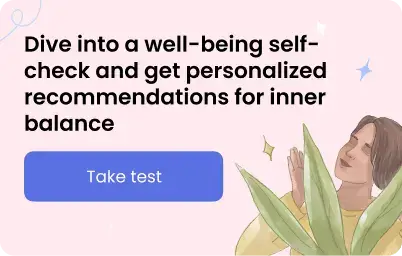We’ve all been there – that knot in your stomach before a big presentation or the racing thoughts as you pack for a move – it’s anxiety, a normal part of life. But sometimes, it comes in all shapes and sizes: fleeting flashes, anxiety, or panic attacks.
When symptoms are frequent or constant guests in your daily life, it should ring a bell, as it could be an anxiety disorder.
So if you ever found yourself with a heartbeat like a drum solo and sweaty palms, you might have experienced an anxiety attack… or wait.. maybe it was a panic attack? And how long can an anxiety attack last?
How long does an anxiety attack last?
So, how long does it take to get anxiety away? Usually, anxiety attacks last about 30 mins.
But during an anxiety attack, time can seem to crawl, and you may feel those 30 minutes like endless hours.
However, it is important to mention that every anxiety attack is a unique experience. What one person feels during an attack can be vastly different from another. The intensity and duration of anxiety attacks may vary widely.
For example, for one person, anxiety episodes might show up as excessive worry, irritability, muscle tension, and difficulty concentrating. While for others, anxiety may develop into severe panic attacks with a rapid heartbeat, sweating, dizziness, nausea, and trembling.
Can anxiety attacks last for days?
Now, what about those prolonged anxiety attacks?
Unfortunately, sometimes anxiety has long-term effects. In some cases, it can last hours or even days.
You might be wondering if that counts as a days-long anxiety attack. It’s more accurate to describe this as a state of elevated anxiety rather than a continuous attack.
While anxiety attacks last around 30 minutes and are typically short-lived, intense episodes of fear or discomfort, prolonged periods of heightened anxiety might be a more persistent condition, such as Generalized Anxiety Disorder (GAD).
This is often characterized by excessive worry and tension that lasts for weeks or even months.
How long can a panic attack last?
And what about a panic attack? How long does it take? Usually, it’s 5 to 20 minutes, but some can go on for an hour. How often they happen depends on how hard your condition is.
Some people have them once or twice a month, while others experience them more often. But can panic attacks last days? In very rare cases. There is anecdotal evidence that a panic attack could last days, but research has found they usually subside within an hour.
Having one panic attack is tough, but imagine getting hit with multiple panic attacks in one day. It’s like a never-ending wave of panic that really stresses your body.
This happens because anxiety tricks your body into thinking it’s in a life-or-death situation, and it keeps pumping adrenaline. It’s like facing a dangerous snake over and over again, which is not exciting.
This is what Katherine Pocock, Clinical Neuropsychiatrist, MBPsS, says about panic attacks:
“Panic attacks can be a frightening experience, but remember that what goes up must come down, and they will always subside.
Mindfulness and grounding techniques can be really helpful, and they’re practicable skills – the more you practice them, the more effective they can be. Practicing these skills while you feel okay can make them much easier to use while you feel anxious or panicked.
If you feel that panic and anxiety are negatively impacting your life, please seek advice from a mental health or medical professional.”
How do stop an anxiety attack?
When anxiety hits, your mind gets stuck on it, making things worse. To beat generalized or extreme anxiety, shift your focus from overwhelming thoughts to simple senses. It’s called grounding – this helps you come back to the present and feel calm.
To help you get it through, I’ve prepared the 5 most grounding tips on how to handle anxiety episodes. “These are all really solid tips I have used in treatments, too,” noted Katherine Pocock, Clinical Neuropsychiatrist, MBPsS.
- Breathe deeply. You might experience shortness of breath from anxiety, too. Slow, deep breaths can significantly reduce stress and anxiety. So when you feel extreme anxiety coming on, try rule 333, taking slow, deep breaths and counting to 10 with each inhale and exhale.
- Pop a sour candy. The intense taste can be a powerful distraction, bringing you back to the present moment.
So next time you feel a surge of anxiety, reach for the best sour candy for panic attacks and take a bite towards calm. It can be a Warhead or Jolly Rancher or whatever works for you
- Check your surroundings: Focus on familiar objects around you. Remind yourself that this feeling, like those objects, will pass. Prioritize safety if needed.
- Repeat a mantra. Create a personal affirmation to support yourself. Examples include “I am safe, and nothing is going to happen to me” or “I feel calm, and everything is alright.” For a better effect, you can also try meditation.

Following up with Breeze
Panic episodes aren’t just scary. They can mess with your life.
Yes, they hit hard and fast. But typically, they peak around 10 minutes, then slowly fade. But anxiety can last for days.
If anxiety is making things tough, like work, school, or even hanging out, it’s time to take action and visit a healthcare professional.
But there’s more you can do! Breeze can be your personal healer, which will help anxiety go away. It’s a self-help platform based on CBT principles, and it’s packed with resources to:
- Understand your anxiety.
- Challenge negative thoughts.
- Develop coping skills.
- Calm your mind and body.
It’s full of courses, tests, tools to track your mood, and more, all designed to help you feel better.
Remember, you don’t have to wait for an appointment to start feeling better. Breeze is right here, ready to support you on your journey to calmer days. Take charge of your anxiety today!
“How long do anxiety attacks last?” Q&A
What is the difference between anxiety and panic attacks?
Mostly, different types of generalized anxiety can be triggered by both known and unknown stressors for you. It builds gradually, so you may not feel it when it’s coming.
Panic attacks are a bit different. When anxiety reaches critical levels, a panic attack occurs. Like generalized anxiety, panic attacks can be caused by a trigger or can happen for no apparent reason.
They can make you feel out of control and come with physical symptoms so intense that they’re often mistaken for heart attacks. Panic attacks feel intense, making you think you are having a heart attack and losing control.
“Unexpected panic attacks are needed for a diagnosis of Panic Disorder. Otherwise, another diagnosis might be more appropriate, and this might be where the confusion comes in,” says Katherine Pocock, Clinical Neuropsychiatrist, MBPsS.
What are the symptoms of anxiety and panic attacks?
Both anxiety and panic attacks share some physical symptoms, such as rapid heartbeat, sweating, and shortness of breath. However, the intensity of these symptoms is generally higher during a panic attack.
How can I tell if I’m having an anxiety attack or a panic attack?
Distinguishing between anxiety and panic attacks can be difficult as they share similarities. The key differences lie in the onset, duration, and intensity of symptoms.
Panic attacks tend to have a sudden onset, are more intense, and have a shorter duration compared to anxiety.
Disclaimer
This article is for general informative and self-discovery purposes only. It should not replace expert guidance from professionals.
Any action you take in response to the information in this article, whether directly or indirectly, is solely your responsibility and is done at your own risk. Breeze content team and its mental health experts disclaim any liability, loss, or risk, personal, professional, or otherwise, which may result from the use and/or application of any content.
Always consult your doctor or other certified health practitioner with any medical questions or concerns
Breeze articles exclusively cite trusted sources, such as academic research institutions and medical associations, including research and studies from PubMed, ResearchGate, or similar databases. Examine our subject-matter editors and editorial process to see how we verify facts and maintain the accuracy, reliability, and trustworthiness of our material.
Was this article helpful?




